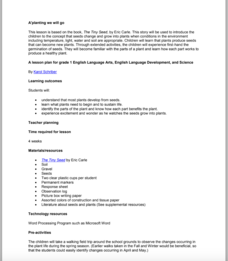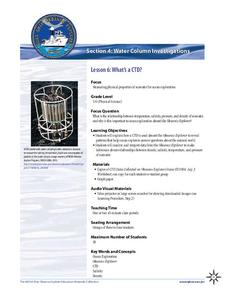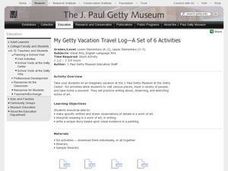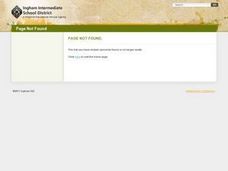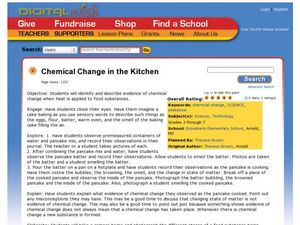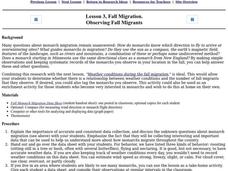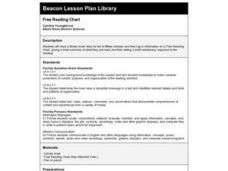ReadWriteThink
Webcams in the Classroom: Animal Inquiry and Observation
Boost observational skills with an inquiry-based lesson that takes scholars on a virtual field trip. With help from webcams, learners observe animals in a zoo or aquarium. Observations go into a journal and a discussion is held to review...
Curated OER
Using an Observation Log to enhance studies in biology
Young scholars choose a subject or setting that be suitable for them to observe for the entire school year. They are encouraged to pick a site that they have ready access to and that they believe be interested in.
Curated OER
A'planting We will Go
Germination is an amazing process that results in amazing things. The book The Tiny Seed is the inspiration for a set of activities that will help build early literacy, observation, language, and writing skills. The class observes how...
NOAA
What's a CTD?
Why are the properties of the water important when exploring the ocean? Young scientists discover the tools and technology used in deep sea exploration in the fourth installment in a five-part series. Groups work together to...
Curated OER
My Getty Vacation Travel Log-A Set of 6 Activities
Students take an imaginary vacation at the J. Paul Getty Museum. They participate in six activities while writing, observing and sketching works of art.
EngageNY
The Most Important Property of Logarithms
Won't the other properties be sad to learn that they're not the most important? The 11th installment of a 35-part module is essentially a continuation of the previous lesson, using logarithm tables to develop properties. Scholars...
Curated OER
Technology Integration Project Weather Unit Plan
Students use a variety of technology-assisted weather observation tools to observe and record local weather. They identify, measure and record weather conditions, summarize types of clouds and make graphs of their observations. Students...
Curated OER
Keeping a Daily Weather Log
Students create their own daily log books for recording and keeping track of the weather.
Curated OER
The Blue Bottle: An Example of Teacher-Guided Inquiry
Students observe a demonstration in which a bottle containing a colorless solution is mixed, turns blue, then becomes colorless again. They record observations, form and discuss hypotheses, and draw a conclusion based on the evidence.
Curated OER
Life in a Log
Young scholars identify insects living in rotting logs. In this decomposition lesson, students observe pieces of a rotting log, they look at the insects that have inhabited the log and create a chart that shows their findings.
Curated OER
Weather Log
Students develop the skill of recording weather observations. Not only students be responsible for recording visual observations of the sky, but also collecting and recording weather instrument data.
Curated OER
What in the World..?!?
Students photograph mystery images. In this observation skills lesson, students gather everyday objects and place them under a digital microscope. They magnify the image and take a photograph of it. The image is then displayed on the...
Curated OER
Observing and Predicting Weather from a Weather Station
Fourth graders us a Weather Log data chart to record the date, time, day, and weather. They discuss different instruments and charts needed to record the information. Students turn in their weather logs at the end of two weeks and...
Curated OER
Chemical Change in the Kitchen
Students examine chemical changes to food. In this chemical changes lesson plan, students make foods and observe the changes. The changes are recorded in an observation journal. Students photograph food they make at different stages in...
Curated OER
What Lives in the Forest?
Students investigate nearby forests and record their interactions with trees as well as wild life. In this ecology lesson, students read the book, In the Woods: Who's Been Here?, and attend class observational field trips through...
Curated OER
Change Agents
Third graders experiment with three erosive change agents. They do an observation log, which they present to the class through a song, poem or skit.
Curated OER
Observing Fall Migrants
Students keep a detailed data collection log of the different types of monarch behavior. They track the weather conditions daily and link it to the migration of the monarchs. They summarize their data using either a graph or a computer...
Pulitzer Center
Extractive Industries
Here is a chance for environmental studies classes to take a critical look at crises occurring around the globe by reading articles and viewing video clips. The human activities under scrutiny are the extraction of oil, logging, and...
Facing History and Ourselves
Fishbowl Discussion
Filter young teenagers' opinions and perspectives with a classic fishbowl discussion. Given any topic relevant to your curriculum, a group of class members engage in discussion for their peers to observe.
Curated OER
Oh, What A Day
Students listen as the teacher reads A Country Far Away. They predict what they will do and what they think their partner student will be doing. Students create a KWL chart for Japan. They collect information about their activities on an...
Novelinks
The Devil’s Arithmetic: QAR Strategy
Asking questions about the text is an important way for kids to become critical readers. Use a QAR activity based on The Devil's Arithmetic to help learners decipher between questions that are right there, between the author and the...
Explore Sound
Sound and Music
What causes sound? Groups of sound detectives use a variety of tools including ping pong balls, pasta noodles, raisins, rubber mallets, and a tuning fork to investigate what causes sound. The young Sherlocks conduct a series of...
Curated OER
the Naturalist's Notebook
Third graders, after brainstorming what they already know about trees and what effect the seasons have on them, create a model of a hollow log. They participate in a young naturalist's notebook writing activity while walking outside...
Curated OER
Free Reading Chart
Learners read library books daily for ten to fifteen minutes, log information on Free Reading Chart, giving a brief summary of what they just read, and write brief reactionary response to the reading.


